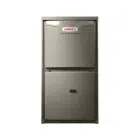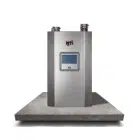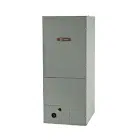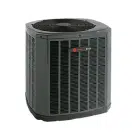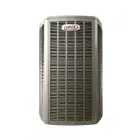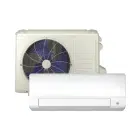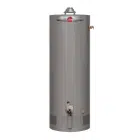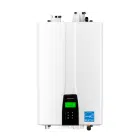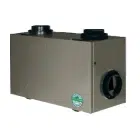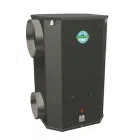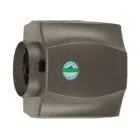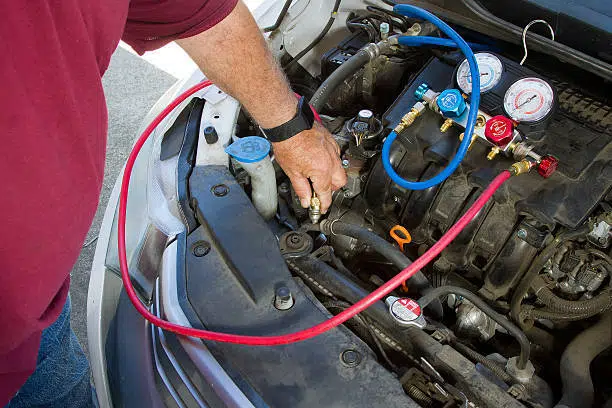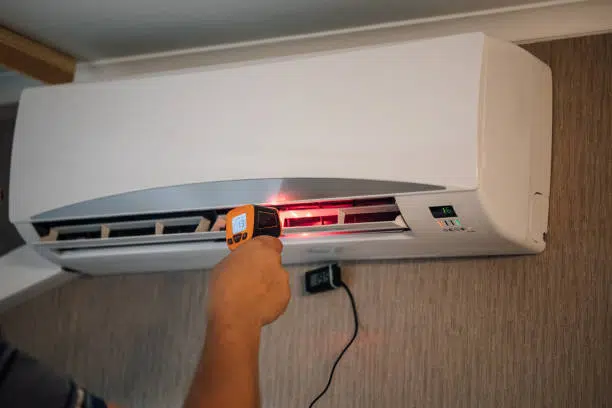
Table of Contents
Refrigerant is the lifeblood of your air conditioning system. Without it, your AC simply can’t cool the air effectively. When your unit starts acting up—like blowing warm air or running longer than usual—there’s a good chance it’s due to low refrigerant in AC.
One of the most common reasons for an AC not cooling properly is a refrigerant leak. Knowing the signs of low refrigerant in AC early can help you avoid expensive repairs and keep your home comfortable. This guide will walk you through the key warning signs and what steps to take next.
What Is Refrigerant and Why Is It So Important?
Refrigerant is a chemical compound that circulates through your AC system, absorbing heat from inside your home and releasing it outside. It’s not something that “runs out” over time—if levels are low, there’s likely a leak.
When there’s low refrigerant in AC, it can’t absorb enough heat, meaning your system won’t cool properly. Worse, your compressor has to work overtime, which can lead to failure. That’s not just inconvenient—it’s one of the most expensive repairs an air conditioner can need.
Ignoring the signs of refrigerant leak could also mean releasing harmful chemicals into the environment. That’s why it’s crucial to spot the signs early and contact a licensed HVAC technician near you as soon as possible.
7 Clear Signs Your AC Is Low on Refrigerant
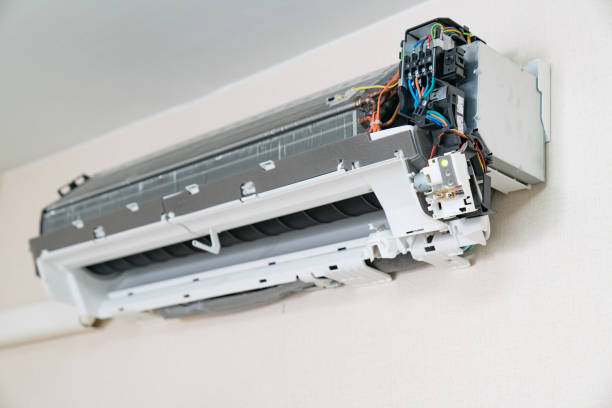
1. AC Blowing Warm Air Instead of Cold
If your air conditioner is running but not cooling, it could be a direct result of low refrigerant in AC. Refrigerant is what absorbs heat—without enough of it, warm air stays inside your home. This is often the first and most obvious warning sign.
2. AC Runs Constantly But Doesn’t Cool
When there’s not enough refrigerant, your AC keeps running in an attempt to reach the desired temperature, but it never quite gets there. This leads to increased wear on your system and higher energy costs. If you notice your AC running non-stop but doesn’t cool, that’s a strong sign of low refrigerant in AC.
3. Ice Buildup on Refrigerant Lines or Evaporator Coil
Ice might seem like a cooling sign, but it actually signals trouble. Low refrigerant lowers pressure in the system, causing moisture to freeze on the evaporator coil. If you see ice on your lines or unit, shut off the system and call a licensed HVAC technician near me immediately.
4. Hissing or Bubbling Sounds
These sounds often mean a refrigerant leak. Hissing typically comes from small leaks, while bubbling suggests a more significant issue in the line. Both are classic signs of refrigerant leak and require fast professional attention.
5. Increased Energy Bills
When your AC isn’t cooling efficiently, it runs longer and harder to maintain the temperature. This leads to a spike in your utility bills. If you notice a sudden jump in energy costs without changes in usage, consider checking for signs of low refrigerant in AC.
6. Humid Air Indoors Even When AC Is On
Air conditioners are designed to remove moisture from the air as part of the cooling process. Low refrigerant means the system can’t dehumidify effectively, making your home feel sticky and uncomfortable.
7. Visible Refrigerant Leaks
If you notice oily residue or pooling liquid near your unit, it might be refrigerant. This isn’t just bad for your AC—it’s harmful for the environment. Don’t attempt to clean or refill it yourself. Schedule an air conditioner refrigerant recharge in Canada with a qualified technician.
Dangers of Running Your AC With Low Refrigerant
Continuing to run your system with low refrigerant in AC is risky. Here’s why:
- Compressor Damage: The compressor relies on refrigerant for cooling. Without it, it overheats and may burn out, leading to costly repairs or a full system replacement.
- System Inefficiency: An AC with low refrigerant works harder, using more energy and delivering worse performance.
- Environmental Impact: Leaking refrigerant contributes to ozone depletion and climate change.
- Costly Future Repairs: Delaying repairs can turn a small leak into a major mechanical failure. Spotting the signs of refrigerant leak early helps avoid that.
What to Do If You Notice These Signs
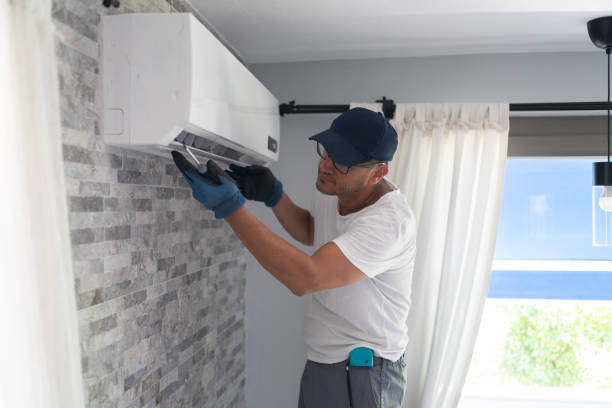
If you notice signs of low refrigerant in AC, there are a few safe steps you can take before calling a professional:
- Check your air filter: A clogged filter can mimic cooling issues. Replace it if it’s dirty.
- Inspect for ice buildup on the air conditioner: Turn off the system and let it thaw if you notice any ice.
- Note unusual sounds: Hissing or bubbling can help pinpoint the problem location.
However, do not attempt to refill or repair refrigerant lines on your own. In Canada, only a licensed HVAC technician near me is authorized to handle refrigerants.
Here’s what a professional will do:
- Perform a full system inspection and leak detection test
- Repair the source of the leak—recharging alone is not a permanent fix
- Complete an air conditioner refrigerant recharge in Canada according to safety regulations and manufacturer standards
Remember, ignoring signs of low refrigerant in the AC or topping off refrigerant without addressing the leak will only lead to repeat problems. Timely AC professional repair ensures your system runs efficiently and safely.
Conclusion
Low refrigerant isn’t just a minor inconvenience—it’s a critical issue that affects your comfort, your energy bills, and the lifespan of your system. Recognizing the signs of low refrigerant in AC early helps prevent major breakdowns and unnecessary costs.
Whether it’s strange sounds, weak airflow, or a spike in utility bills, don’t ignore the symptoms. Contact a licensed HVAC technician for a proper diagnosis and an air conditioner refrigerant recharge in Canada.
At HVAC Service Solutions, we’re here to help. Call us today to schedule an inspection or recharge. Let’s keep your home cool and efficient all season long.
FAQs
1. How can I tell if my AC is low on refrigerant?
Common signs include your AC blowing warm air, running constantly without cooling, ice buildup on the coils, hissing or bubbling noises, and higher energy bills. You might also notice increased humidity indoors or visible refrigerant leaks near the unit. These symptoms indicate that your AC isn’t absorbing heat properly—one of the clearest signs of low refrigerant in AC.
2. Will my AC stop working completely if the refrigerant is low?
Not right away, but the system will become less effective and may overheat. If you keep using it without addressing the issue, the compressor could fail, which is a costly repair. That’s why recognizing the signs of refrigerant leak early is important for preventing total system failure.
3. Can I just add more refrigerant to fix the issue?
No. Simply adding more refrigerant without fixing the leak is a short-term solution and may even be illegal in Canada. You need a licensed HVAC technician near me to detect and repair the leak first, then perform an air conditioner refrigerant recharge in Canada that meets all regulations.
4. Why is my AC running constantly but not cooling my home?
This often indicates low refrigerant in AC. The system can’t remove enough heat from your home, so it keeps running in an effort to reach the set temperature. This not only increases your energy bill but also puts strain on your AC components.
5. Is it dangerous to run an AC with low refrigerant?
Yes, it can damage the compressor and other parts of your AC. Additionally, refrigerant leaks can be harmful to the environment. If you hear hissing sounds or see ice buildup, it’s best to shut off the unit and call a licensed HVAC technician near me right away.
6. How does low refrigerant affect indoor humidity?
Low refrigerant reduces your AC’s ability to remove moisture from the air, leaving your home feeling sticky and uncomfortable. If your system runs but you still feel humid air, it could be one of the signs of low refrigerant in AC.
7. What does a refrigerant leak look like?
Leaks often show as oily residue or a thin puddle near the outdoor unit. You might also hear a hissing or bubbling noise. These are classic signs of refrigerant leak and should be addressed immediately by a certified technician.
8. How much does it cost to recharge refrigerant in Canada?
The cost of an air conditioner refrigerant recharge in Canada varies depending on the type of refrigerant, system size, and whether leak repairs are needed. On average, it can range from $150 to $600, but it’s always best to get a full diagnosis first.
9. Can a dirty filter cause the same symptoms as low refrigerant?
Yes, a clogged air filter can restrict airflow and cause your AC to work harder, sometimes mimicking the effects of low refrigerant. Always check your filter first before jumping to conclusions. If changing it doesn’t help, it’s time for a professional inspection.
10. Who should I call if I suspect a refrigerant issue?
Always call a licensed HVAC technician near you is certified to handle refrigerants. In Canada, it’s illegal for unlicensed individuals to work with refrigerants due to safety and environmental concerns. A professional will safely detect leaks, repair them, and handle the recharge correctly.
Share

